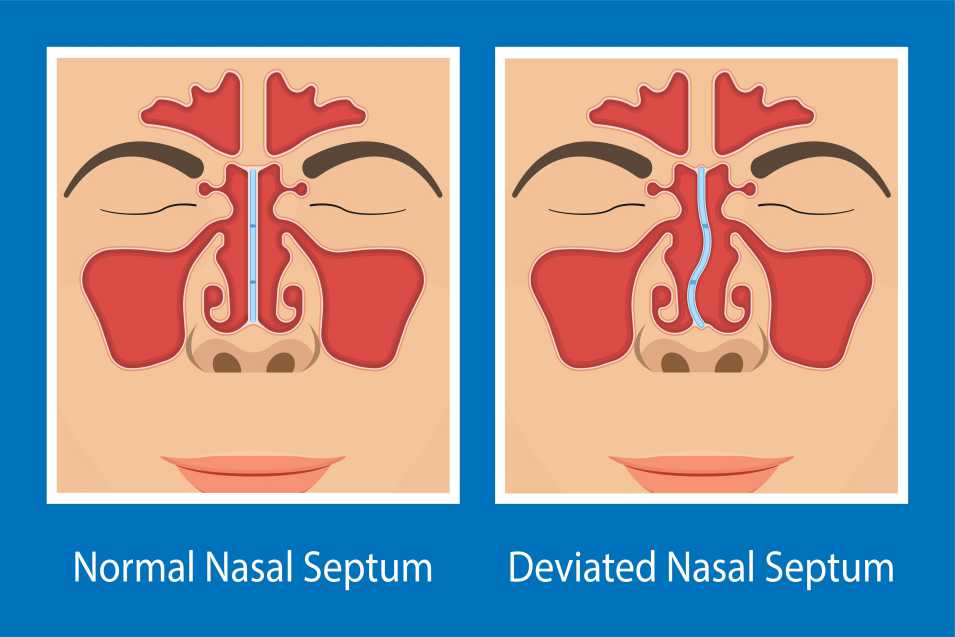
Deviated septum surgery is a common procedure performed to correct a misalignment of the nasal septum, the cartilage that separates the nostrils. While this surgery can significantly improve breathing and overall quality of life for individuals with a deviated septum, it is essential to understand the role of medical necessity and insurance approval in the process.
Medical necessity plays a crucial role in determining whether insurance companies will cover the cost of deviated septum surgery. The concept of medical necessity refers to the requirement that a treatment or procedure must be considered essential to diagnose, prevent, or treat a medical condition. In the case of deviated septum surgery, it must be demonstrated that the deviation causes significant functional impairment or related health issues, such as chronic sinusitis or sleep apnea.
To obtain insurance approval for deviated septum surgery, a comprehensive evaluation by an otolaryngologist, also known as an ear, nose, and throat (ENT) specialist, is necessary. The ENT specialist will assess the severity of the deviation through a physical examination and may order additional diagnostic tests, such as a nasal endoscopy or a CT scan. The findings from these evaluations help determine the medical necessity of the surgery.
When preparing a request for insurance approval, it is crucial to compile all relevant medical documentation, including test results, doctor's notes, and a detailed explanation of the patient's symptoms and their impact on daily life. The request should clearly outline how the surgery will address the medical condition and improve the patient's quality of life, emphasizing the functional benefits rather than cosmetic aspects.
Insurance companies often require pre-authorization before approving deviated septum surgery. This means that the surgeon and patient must submit all the necessary information and wait for the insurance company's decision. It is important to follow the specific guidelines and requirements set forth by the insurance provider to increase the chances of approval.
obtaining insurance approval for deviated septum surgery requires demonstrating medical necessity and providing comprehensive documentation. Working closely with an ENT specialist and following the insurance company's guidelines can enhance the chances of a successful approval. Remember, each case is unique, and it is essential to consult with healthcare professionals and insurance representatives to navigate the process effectively.
Navigating the Maze: Understanding the Insurance Approval Process for Deviated Septum Surgery
Deviated septum surgery can be a life-changing procedure for individuals suffering from breathing difficulties caused by a misaligned nasal septum. However, before undergoing this surgery, it's crucial to understand the insurance approval process associated with it. This article aims to shed light on the intricate maze of insurance procedures involved, ensuring a smooth journey towards obtaining coverage for deviated septum surgery.
The first step in navigating this maze is understanding the role of health insurance providers in approving such surgeries. Insurance companies typically require medical evidence that establishes the medical necessity of the procedure. This evidence often includes documentation of failed conservative treatments, such as nasal sprays or medications, along with diagnostic tests confirming the deviation's severity.
To start the approval process, it's important to consult an otolaryngologist, also known as an ENT specialist, who will assess your condition and develop a treatment plan. The specialist will thoroughly examine your nasal passages using various diagnostic tools like endoscopy or CT scans. These findings will serve as supporting evidence during the insurance approval process.
Next, your ENT specialist will collaborate with your primary care physician to gather all the required documentation. They will prepare a comprehensive report detailing your medical history, the impact of the deviated septum on your quality of life, and the failure of non-surgical interventions. This report will provide compelling evidence to support your case for insurance coverage.
Once the documentation is complete, your healthcare team will submit the application to your insurance company. It's crucial to review your policy carefully and ensure that your surgeon and hospital are in-network providers to maximize coverage. The insurance company will evaluate the submitted documents, considering factors such as medical necessity, policy limitations, and pre-authorization requirements.
During this evaluation process, it's essential to maintain open communication with your healthcare team and insurance provider. Follow up regularly to check the progress of your application and address any additional information or documentation requirements promptly. Patience and persistence are key as the approval process can take time.
understanding the insurance approval process for deviated septum surgery is vital to ensure a hassle-free experience. By working closely with your healthcare team, gathering all necessary documentation, and maintaining communication with your insurance provider, you increase your chances of obtaining coverage for this transformative procedure. Remember, each insurance plan may have specific criteria, so it's crucial to familiarize yourself with your policy and advocate for your medical needs.
Behind the Scenes: Unraveling the Criteria for Medical Necessity in Deviated Septum Surgery
Deviated septum surgery, also known as septoplasty, is a procedure performed to correct a condition where the nasal septum, the thin wall between the nostrils, is crooked or deviated. While it may seem like a straightforward surgical intervention, the decision for medical necessity behind deviated septum surgery involves various factors that need to be considered.
One of the primary criteria for determining the need for deviated septum surgery is the impact on the patient's quality of life. A deviated septum can lead to numerous issues such as breathing difficulties, chronic congestion, recurrent sinus infections, and sleep disturbances. These symptoms can significantly affect an individual's daily activities and overall well-being. Therefore, if conservative treatments like medications and nasal sprays fail to provide relief, surgery becomes a viable option to alleviate these bothersome symptoms.
Another crucial aspect in assessing the medical necessity of deviated septum surgery is the objective evaluation of the severity of the deviation. ENT specialists employ various diagnostic tools, including physical examination, nasal endoscopy, and imaging techniques, to determine the extent of the deviation. The severity of symptoms and the impact on nasal airflow are also taken into account during this evaluation process.
Furthermore, the potential risks and benefits associated with the surgery play a pivotal role in the decision-making process. As with any surgical procedure, there are inherent risks involved, such as bleeding, infection, and adverse reactions to anesthesia. It is essential for healthcare providers to weigh these risks against the potential benefits of improved nasal function and enhanced quality of life.
Medical insurance coverage is another factor that influences the determination of medical necessity. Different insurance companies may have specific guidelines or criteria regarding the coverage of deviated septum surgery. Meeting their defined criteria is crucial to ensure insurance coverage and avoid unnecessary financial burden on the patient.
the decision for medical necessity in deviated septum surgery encompasses several factors, such as the impact on quality of life, objective evaluation of the deviation, risks and benefits of surgery, and insurance coverage guidelines. By carefully considering these criteria, healthcare professionals can determine whether deviated septum surgery is medically necessary for each individual case, ultimately aiming to provide relief from symptoms and improve the patient's overall well-being.
The Battle for Coverage: Overcoming Insurance Obstacles in Deviated Septum Surgery
Having a deviated septum can be more than just an annoyance; it can significantly impact your quality of life. Breathing difficulties, chronic sinus infections, and loud snoring are just a few of the complications that may arise from this condition. Correcting a deviated septum often requires surgery, known as septoplasty. However, navigating the insurance landscape to obtain coverage for this procedure can feel like an uphill battle.
One of the major challenges faced by individuals seeking insurance coverage for deviated septum surgery is the misconception that it is purely a cosmetic procedure. While it is true that septoplasty can enhance the appearance of the nose, its primary purpose is to improve functionality and alleviate symptoms. Educating insurance providers about the medical necessity of this surgery is crucial in overcoming this obstacle.
Another hurdle is the pre-authorization process. Insurance companies often require extensive documentation, including medical records, diagnostic tests, and physician evaluations, before granting approval for surgery. This meticulous review aims to ensure that the procedure is medically necessary. However, it can be time-consuming and frustrating for patients who are already dealing with the discomfort caused by their deviated septum.
Additionally, some insurance plans may impose limitations on coverage for deviated septum surgery. They might consider it a “pre-existing condition” or place it under a category of exclusions. These restrictions can prevent individuals from receiving the treatment they need to improve their health and well-being. Advocacy groups and healthcare professionals play a vital role in challenging these barriers and advocating for expanded coverage.
Overcoming these insurance obstacles requires persistence and support. Patients should work closely with their healthcare providers to gather all necessary documentation and submit comprehensive claims. Seeking guidance from patient advocacy organizations can provide valuable resources and assistance throughout the process.
obtaining insurance coverage for deviated septum surgery can be a challenging endeavor. Understanding the medical necessity of the procedure, navigating the pre-authorization process, and addressing coverage limitations are essential steps in overcoming these obstacles. By advocating for themselves and seeking support from healthcare professionals and advocacy groups, individuals can increase their chances of successfully obtaining coverage for this transformative surgery.
Decoding the Paperwork: Tips and Tricks for a Successful Insurance Claim in Deviated Septum Surgery
Giriş:
Deviasyon ameliyatı, burun septumunun eğri olduğu durumlarda yapılan bir cerrahi müdahaledir. Ancak bu tür bir operasyon sıklıkla sigorta şirketleri tarafından kapsanmayabilir veya başvuru süreci karmaşık olabilir. Bu makalede, deviasyon ameliyatında sağlıklı bir sigorta talebi yapmak için evrakları çözümlemek için bazı ipuçları ve püf noktalarını ele alacağız.
-
Doğru evraklar:
Sigorta talebinizin kabul edilmesi için doğru belgeleri sağlamanız önemlidir. İlk adım, hekiminizden hastalığınızın teşhisi ve ameliyatın gerekliliği hakkında yazılı bir rapor almanızdır. Ayrıca, sigorta talebinizin desteklenmesi için tıbbi kayıtlarınızı, ameliyat öncesi ve sonrası fotoğrafları, laboratuvar sonuçlarını vb. toplamalısınız. -
Sigorta planınızı inceleyin:
Sigorta poliçenizi dikkatlice gözden geçirerek, deviasyon ameliyatının kapsamına ilişkin ayrıntılara bakın. Bazı planlar bu tür operasyonları kapsarken, bazıları kapsamayabilir veya belirli koşullara tabi tutabilir. Sigorta şirketinizin taleplerini karşılamak için yapılan düzenlemeleri anlamak önemlidir. -
Ön onay alın:
Sigorta şirketinizi arayarak önceden onay almanız, sigorta talebinizin kabul edilme olasılığını artırabilir. Ameliyat öncesinde prosedürleri ve gereklilikleri netleştirmek için sigorta sağlayıcınıza danışın. Bu sayede, sigortanızın ameliyat masraflarını karşılayıp karşılamayacağı konusunda daha fazla bilgi sahibi olabilirsiniz. -
Yeterli zaman ayırın:
Sigorta talebi sürecinin uzun sürebileceğini unutmayın. Başvurunuzu zamanında yapmak ve evraklarınızı tamamlamak için yeterli zaman ayırmanız önemlidir. Sigorta şirketiyle düzenli iletişim kurarak talebinizin ilerleyişini takip edin ve herhangi bir ek bilgi veya belge taleplerine hızlı yanıt verin. -
Profesyonel yardım alın:
Sigorta süreci karmaşık olabilir ve yanlış bir adım atmanız talebinizin reddedilmesine yol açabilir. Bir sigorta danışmanı veya avukatından profesyonel yardım almak, başvurunun doğru bir şekilde hazırlanmasına ve gerektiğinde itiraz sürecinde size rehberlik etmesine yardımcı olabilir.
Sonuç:
Deviasyon ameliyatında başarılı bir sigorta talebi için evrakları doğru şekilde işlemlemek büyük önem taşır. Doğru belgeleri toplamak, sigorta planınızı incelemek, ön onay almak, yeterli zaman ayırmak ve gerektiğinde profesyonel yardım almak, talebinizin kabul edilme şansını artırır. Bu ipuçlarına dikkat ederek, sigorta sürecini daha kolay ve başarılı bir şekilde yönetebilirsiniz.
is deviated septum surgery covered by insurance
does insurance cover deviated septum surgery
how much does deviated septum surgery cost
Önceki Yazılar:
- Erzurum Horasan Opel Oto Yedek Çıkma Parçaları
- Opencart E-ticaret Paketleri İle E-ticaret Sitenizi DDoS Saldırılarından Koruma
- Bulk Yapmanın Psikolojik Etkileri Motivasyonu Yüksek Tutma Stratejileri
- Türkçe Blog Nedir Ve Blog Nasıl Yazılır
- Gaziosmanpaşada Su Tesisatı Arızalarının Nedenleri
Sonraki Yazılar:

 puro satın al Otobüs Bileti Uçak Bileti Heybilet Türkiye Belçika Eşya Taşıma
puro satın al Otobüs Bileti Uçak Bileti Heybilet Türkiye Belçika Eşya Taşıma